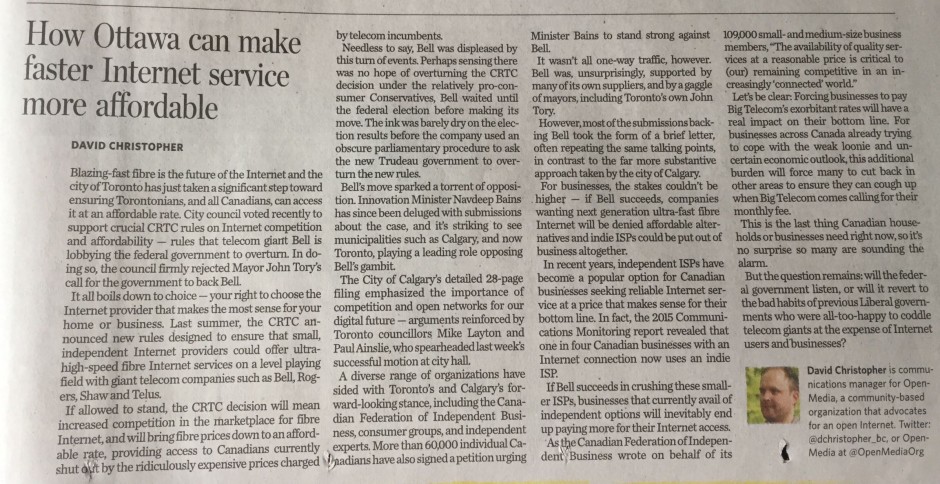How Ottawa can make fast Internet more affordable
Writing in the Toronto Star, our David Christopher looks at why the federal government should support a crucial CRTC decision that could make affordable fibre Internet a reality for homes and businesses across Canada.
This piece by our own David Christopher was originally published in the Toronto Star, see the original piece here.
Blazing-fast fibre is the future of the Internet and the City of Toronto has just taken a significant step toward ensuring Torontonians, and all Canadians, can access it at an affordable rate. City council voted recently to support crucial CRTC rules on Internet competition and affordability — rules that telecom giant Bell is lobbying the federal government to overturn. In doing so, the council firmly rejected Mayor John Tory’s call for the government to back Bell.
It all boils down to choice — your right to choose the Internet provider that makes the most sense for your home or business. Last summer, the CRTC announced new rules designed to ensure that small, independent Internet providers could offer ultra-high-speed fibre Internet services on a level playing field with giant telecom companies like Bell, Rogers, Shaw, and Telus.
If allowed to stand, the CRTC decision will mean increased competition in the marketplace for fibre Internet, and will bring fibre prices down to an affordable rate, providing access to Canadians currently shut out by the ridiculously expensive prices charged by telecom incumbents.
Needless to say, Bell was displeased by this turn of events. Perhaps sensing there was no hope of overturning the CRTC decision under the relatively pro-consumer Conservatives, Bell waited until the federal election before making its move. The ink was barely dry on the election results before the company used an obscure parliamentary procedure to ask the new Trudeau government to overturn the new rules.
Bell’s move sparked a torrent of opposition. Innovation Minister Navdeep Bains has since been deluged with submissions about the case, and it’s striking to see municipalities like Calgary, and now Toronto, playing a leading role opposing Bell’s gambit.
The City of Calgary’s detailed 28-page filing emphasized the importance of competition and open networks for our digital future — arguments reinforced by Toronto councillors Mike Layton and Paul Ainslie, who spearheaded last week’s successful motion at city hall.
A diverse range of organizations have sided with Toronto and Calgary’s forward-looking stance, including the Canadian Federation of Independent Business, consumer groups, and independent experts. More than 60,000 individual Canadians have also signed a petition urging Minister Bains to stand strong against Bell.
It wasn’t all one-way traffic, however. Bell was, unsurprisingly, supported by many of its own suppliers, and by a gaggle of mayors, including Toronto’s own John Tory. However, most of the submissions backing Bell took the form of a brief letter, often repeating the same talking points, in contrast to the far more substantive approach taken by the City of Calgary.
For businesses, the stakes couldn’t be higher — if Bell succeeds, companies wanting next generation ultra-fast fibre Internet will be denied affordable alternatives and indie ISPs could be put out of business altogether.
In recent years, independent ISPs have become a popular option for Canadian businesses seeking reliable Internet service at a price that makes sense for their bottom line. In fact, the 2015 Communications Monitoring report revealed that one in four Canadian businesses with an Internet connection now uses an indie ISP.
If Bell succeeds in crushing these smaller ISPs, businesses that currently avail of independent options will inevitably end up paying more for their Internet access.
As the Canadian Federation of Independent Business wrote on behalf of its 109,000 small- and medium-size business members, “The availability of quality services at a reasonable price is critical to [our] remaining competitive in an increasingly ‘connected’ world.”
Let’s be clear: forcing businesses to pay Big Telecom’s exorbitant rates will have a real impact on their bottom line. For businesses across Canada already trying to cope with the weak loonie and uncertain economic outlook, this additional burden will force many to cut back in other areas to ensure they can cough up when Big Telecom comes calling for their monthly fee.
This is the last thing Canadian households or businesses need right now, so it’s no surprise so many are sounding the alarm. But the question remains: will the federal government listen, or will it revert to the bad habits of previous Liberal governments who were all-too-happy to coddle telecom giants at the expense of Internet users and businesses?


 Take action now!
Take action now!
 Sign up to be in the loop
Sign up to be in the loop
 Donate to support our work
Donate to support our work